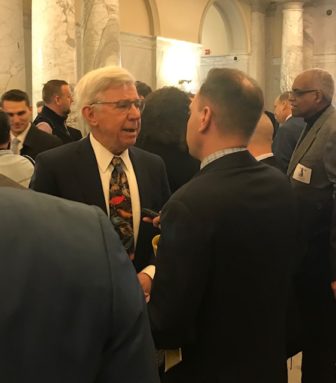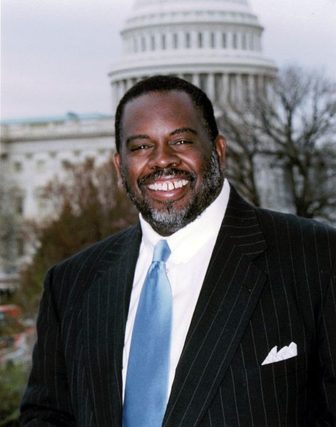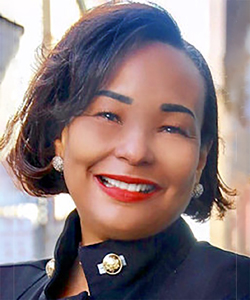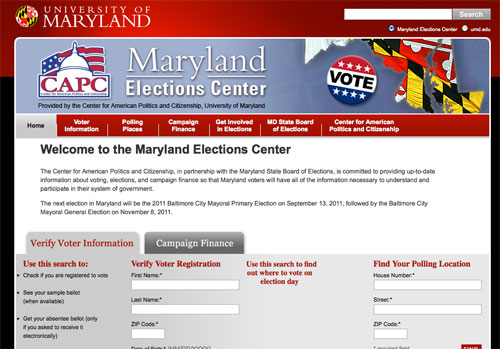Glendening: Maryland can do better with African American political engagement
@BryanRenbaum
[email protected]
Former Maryland Gov. Parris Glendening said the results in a recent study that ranked Maryland No. 13 for the states with the highest African American political engagement are good but not good enough.
“Being number thirteen is good but it’s certainly not great. I think it illustrates the opportunity for us to expand participation significantly. I also think, in terms of the upcoming presidential election, both here in Maryland and across the country — one of the key outcomes will be the participation and rank of the African American population,” Glendening told MarylandReporter.com in a phone interview on Monday.

Maryland Reporter.com’s Bryan Renbaum interviews former Maryland Gov. Parris Glendening at the State House on Feb. 5, 2020, after Gov. Larry Hogan’s State of the State address. (MarylandReporter.com photo)
Glendening, a Democrat, who served from 1995-2003, said: “If it [African American turnout] had been normal in 2016, we almost certainly would not have had Donald Trump as president. Politics matters. You see the policies…so I’m hoping that a portion of it changes considerably.”
Glendening noted that Maryland, which has the largest percentage of African Americans of any state outside the deep south, has near proportionate black representation in the state legislature and in the state’s congressional delegation.
WalletHub.com conducted the study and featured it in an article on Feb. 19. Minnesota ranked first in African American political engagement. South Dakota ranked last. Montana was not included in the study due to lack of data.
The results are based on African American voter registration and turnout in both the 2018 midterm elections and the 2016 presidential election. They also are based on the proportional representation of African Americans in state legislatures and as delegates to both the Democratic and Republican National conventions. WalletHub used data compiled by government agencies including the U.S. Census Bureau and the Joint Center for Political and Economic Studies.

Former Rep. Albert Wynn, D-Md.
Former Rep. Albert Wynn, a Democrat, represented Maryland’s Fourth Congressional District from 1993-2008. The majority black district encompasses parts of Prince George’s and Anne Arundel counties and is now represented by Rep. Anthony Brown (D). Wynn said he is “only slightly” surprised by the study’s results.
“I would have expected Maryland to rank a little higher, say tenth. Traditionally southern states where discrimination has been more overt have had somewhat higher turnout levels. The turnout differences between eighth and thirteenth are not that substantial, in my opinion. Also, as a navy blue state, there is less tension between the parties — which also affects turnout and the allocation of voter turnout resources from out-of-state sources.”
Sen. Jill Carter, D-Baltimore City, said Maryland should rank higher than No. 13. She attributed the state’s ranking to the Democratic Party taking one of its most loyal constituencies for granted.
“It should absolutely be higher. And the same disconnect exists in Maryland that exists probably in much of the country — which is that the party has failed to adequately address the interests and needs of African Americans…taking black voters for granted, depending on black voters at voting time — and then not addressing their primary concerns or engaging with them when it’s outside of an election.”

Sen. Jill Carter, D-Baltimore City
Carter said Sen. Bernie Sanders (I-Vt.), who is currently the Democratic presidential frontrunner, is perhaps the candidate most in touch with the aspirations of African American voters. Carter said she supports Sanders’ 2020 candidacy. She supported Sanders’ 2016 campaign against Hillary Clinton, who eventually won the Democratic nomination. Many political analysts had said Sanders struggled with African American voters during that campaign. He appears to be doing better this time around, according to a recent poll.
“In talking about things that a lot of black people care about — many of the ideas in his platform really do address a lot of our concerns. Not all, but a lot — like college tuition, like health care for all, like housing affordability, economic opportunity and prosperity.”
Carter is running for the House of Representatives seat representing Maryland’s seventh district and formerly held by the late Rep. Elijah Cummings, who died last October.
Richard Vatz, a professor of political persuasion at Towson University, said the study has “limited value.”
“It is intended to forward an agenda that says African Americans’ voting efforts are subjugated by de jure and de facto realities that are so intended. None of the ‘expert political commentary,’ save that of Prof. Gregory Petrow of the University of Nebraska, Omaha, makes even the slightest effort to provide a disinterested interpretation of the data on African American voting and its causes.
“There are questions which are begged as well by a piece measuring black political engagement, such as whether demographic data are critical in assessing voting and reasons for voting, as well as whether this is an important focus on voting regardless…why is there an unrelenting and unceasing focus on demographics rather than political issues? The anti-Mormon voting in Gov. Mitt Romney’s 2012 presidential campaign, for example, never seemed to be a topic of the pollsters or public political discussion.”
Vatz questioned the utility of the study.
“Studies such as these reinforce and perpetuate the perception and self-identification of black voters as different from all other voters, as voters having uniform and identical views, but not interests similar to other voters. Where are the studies on how blue states differ from red states on the quality of education of African Americans?”

MarylandReporter.com is a daily news website produced by journalists committed to making state government as open, transparent, accountable and responsive as possible – in deed, not just in promise. We believe the people who pay for this government are entitled to have their money spent in an efficient and effective way, and that they are entitled to keep as much of their hard-earned dollars as they possibly can.

